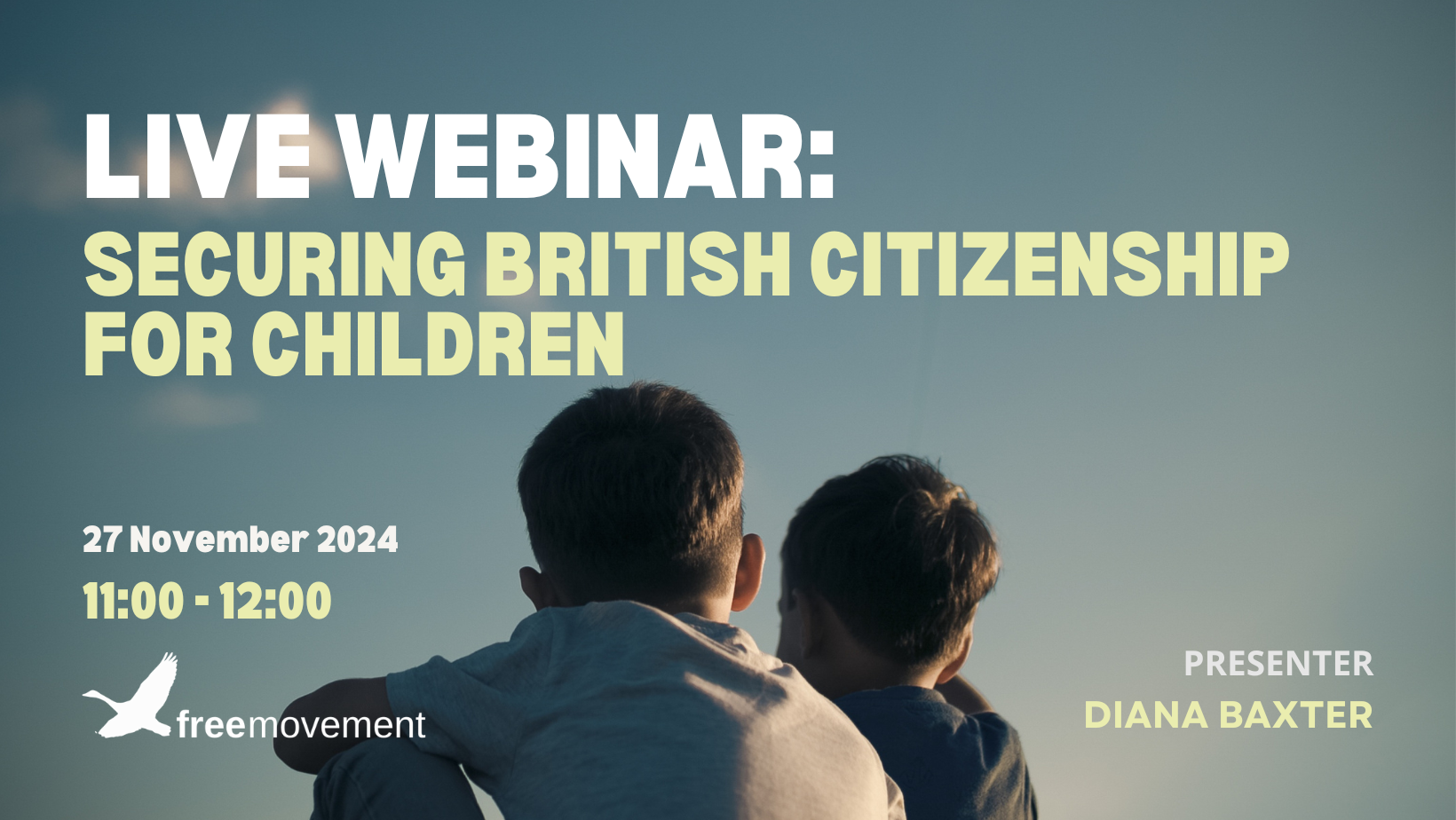The Supreme Courtroom has held that categorical reference to the House Secretary’s guidance on her obligation underneath section 55 of the Borders, Citizenship and Immigration Act 2009 isn’t required in a choice letter in an effort to show that the obligation has been complied with. The court docket additionally held that the part 55 obligation doesn’t apply to the First-tier Tribunal which is able to as a substitute think about the perfect pursuits of the kid inside an article 8 evaluation. This case is CAO (Respondent) v Secretary of State for the House Division (Appellant) (Northern Eire) [2024] UKSC 32.
Prior to now there have been conflicting decisions from completely different jurisdictions, that means that the authorized place in England and Wales and Scotland differed to Northern Eire on this level and that is clearly why the Supreme Courtroom has stepped in.
For anybody who wants a reminder, the part 55 obligation refers back to the want for these exercising immigration, asylum, nationality and customs features to safeguard and promote the welfare of youngsters within the UK. At section 55(3) it states that an individual exercising any of these features “must, in exercising the function, have regard to any guidance” issued by the House Secretary.
Background
The respondent is a Nigerian nationwide who arrived within the UK in September 2018 along with her 16 12 months outdated son and 12 12 months outdated daughter. On 8 November 2018 they utilized for asylum on the grounds of home violence skilled by the respondent and a worry that the daughter can be anticipated to bear feminine genital mutilation if returned to Nigeria.
The applying was rejected on 10 April 2019 and the House Secretary held that the household was additionally not entitled to humanitarian safety and that return to Nigeria wouldn’t breach their rights underneath the European Conference on Human Rights or the Human Rights Act 1998. The refusal letter had a bit known as “Section 55 Consideration” which said that the House Secretary had “taken into account the need to safeguard and promote the welfare of children in the United Kingdom in accordance with the Secretary of State’s duty under section 55 of [the 2009 Act]”. The steerage was not talked about.
The respondent appealed the refusal to the First-tier Tribunal and was represented on the listening to, the House Secretary was not. On 25 February 2020 the enchantment was dismissed, the tribunal discovering important inconsistencies within the respondent’s account. The tribunal additionally referred to the nation coverage and data word “Nigeria: Female Genital Mutilation” and located that the specter of feminine genital mutilation was low for ladies over 5 years outdated and the respondent’s objection to it might act as a “significant protective factor”.
The tribunal additionally held that the police would supply safety if requested and that inside relocation was an choice for the household. The tribunal addressed article 8 on the finish of the choice, which included the conclusion that “it is in the best interests of the children to remain with their mother”. The enchantment was dismissed in its entirety.
The First-tier Tribunal and the Higher Tribunal refused permission to enchantment to the Higher Tribunal. The respondent then sought judicial assessment of the refusal of permission (often called a Cart judicial assessment), elevating for the primary time the argument that there was a failure to adjust to part 55(3) and the related steerage. It was argued that the First-tier Tribunal erred “by ignoring the Secretary of State’s failure to comply with the Guidance and section 55(3) and in assessing the respondent’s daughter’s best interests without relevant evidence which the Secretary of State had a duty to obtain from the daughter pursuant to the Guidance and section 55(3)”.
The Higher Tribunal and the House Secretary agreed to concede the judicial assessment, which meant that the choice refusing permission to enchantment was quashed and was to be remade by a distinct decide. A rolled up listening to occurred and on 25 March 2022 the Higher Tribunal granted permission to enchantment however then went on to dismiss the enchantment on the grounds that the First-tier Tribunal had not dedicated any controversial or materials error of regulation. On the part 55 level, the Higher Tribunal famous that this had not been argued on the First-tier Tribunal and it was not for the tribunal to go on the lookout for points not raised by the respondent, who had been legally represented.
The respondent appealed to the Courtroom of Attraction in Northern Eire.
Conflicting authorized positions
The authorized battle is kind of neatly summarised in our write up of the Upper Tribunal’s decision in Arturas (baby’s greatest pursuits: NI appeals) Lithuania [2021] UKUT 237 (IAC). Arturas stated that in circumstances in England, Wales and Scotland the place the House Workplace had breached part 55(3) via a failure to say the steerage, consideration of the problem of the perfect pursuits of the kid might be carried out by the tribunal as a part of their determination underneath article 8.
Arturas stated that the place in Northern Eire was completely different due to the case of JG v Higher Tribunal Immigration and Asylum Chamber [2019] NICA 27 which held that the tribunal couldn’t make such a choice on the perfect pursuits of the kid. The explanations given by the court docket in JG included reference to the difficulties that such determination making would contain due to the necessity of the court docket or tribunal to adjust to the steerage:
The feasibility of the court docket or tribunal involved, within the wake of a demonstrated breach of the part 55(3) obligation, truly pursuing any of the enquiries or steps laid out in SSHD’s statutory steerage seems to this court docket to be largely theoretical. Steps might after all be taken to make sure that the affected baby’s/youngsters’s views are thought-about through separate illustration, reception of latest proof and an additional listening to. However this course would inevitably generate a lot litigation delay and elevated expense.
Courtroom of Attraction’s determination
Again to CAO, the enchantment was heard within the Courtroom of Attraction in Northern Eire by McCloskey LJ, the identical decide who had determined JG. He defined why he didn’t agree with Arturas and believed his earlier evaluation was right. The respondent’s enchantment was allowed, the choice summarised as follows at paragraph 35 of the Supreme Courtroom’s judgment:
35. In McCloskey LJ’s view, the omission of the Secretary of State to refer within the Determination Letter in phrases to her obligation underneath part 55(3) and to the Steering meant that the inference needed to be drawn that the Secretary of State had breached that obligation. This had the consequence that the Secretary of State’s determination was in breach of her obligation underneath part 6(1) of the HRA to behave compatibly with Conference rights, in that the choice violated article 8 as a result of it was not “in accordance with the law”; the Secretary of State failed correctly to deal with the perfect pursuits of the respondent’s daughter as a main consideration; and her decision-making didn’t fulfill the procedural necessities implicit in article 8. This incompatibility with the article 8 rights of the respondent’s daughter had not been remedied by both the FTT or the Higher Tribunal of their selections, since neither of them had “engaged with the Secretary of State’s breach of the section 55(3) duty”; and there was no foundation for concluding that this breach of statutory obligation had no materials affect on the perfect pursuits evaluation performed by these tribunals in relation to the daughter: para 91.
The Supreme Courtroom
The House Secretary appealed to the Supreme Courtroom. In its judgment, the Supreme Courtroom referred to ZH (Tanzania) v Secretary of State for the House Division [2011] 2 AC 166 and Zoumbas v Secretary of State for the House Division [2013] UKSC 74 each of which clarify that the perfect pursuits of the kid are to be handled as a main consideration when making selections on article 8.
Additionally in relation to ZH (Tanzania), the Supreme Courtroom stated that Woman Hale’s remark at paragraph 24 was obiter, particularly that “any decision which is taken without having regard to the need to safeguard and promote the welfare of any children involved will not be “in accordance with the law” for the aim of article 8(2). Each the Secretary of State and the tribunal will due to this fact have to deal with this of their selections.”
The court docket stated that it had heard no argument on the purpose, and it ought to not be adopted [paragraph 53]. The reasoning was that this remark was in relation to part 55 and the obligation doesn’t apply to the tribunal which is as a substitute topic to the obligation underneath part 6 of the Human Rights Act to determine enchantment in a means that’s suitable with human rights. The place article 8 is raised within the context of a kid that then features a requirement to deal with the pursuits of that baby as a main consideration [paragraph 54].
On the purpose as as to if it may be thought-about that House Workplace determination makers have complied with part 55(3) in circumstances the place they haven’t expressly referred to the steerage, the Supreme Courtroom concluded that “substance prevails over form” [at 67]. After contemplating the related authorities the court docket stated that “The authorities on these similar “have regard” duties present that, in accordance with Parliament’s intention in enacting them, what’s essential when it comes to compliance is that the decision-maker does certainly have regard to the substance of the issues to which the obligation refers.”
The court docket did clarify that “this does not mean that the Secretary of State and his or her officials can disregard the duty under section 55(3) with impunity” after which proceeded to set out quite a lot of potential points and the way they might be challenged.
In relation to the respondent’s case, the Supreme Courtroom held that there was substantive compliance with the steerage and no breach of part 55(3) by the House Secretary. The court docket additionally concluded that the First-tier Tribunal had correctly utilized article 8 together with treating the perfect pursuits of the respondent’s daughter as a main consideration, and the tribunal had no obligation to transcend the case offered to it.
Conclusion
I used to be considering as I used to be going via this that it appears a bit unusual to me that the House Workplace let this all go on for therefore lengthy somewhat than amend their template letters to incorporate specific point out of the part 55 steerage. The Supreme Courtroom made the identical level at paragraph 82: “it would be desirable and not unduly burdensome for the Secretary of State and his or her officials to include reference to the Guidance in their decision letters, even though it is not fatal as a matter of law if they do not”.
The Supreme Courtroom completed with what might be the identical thought a lot of you’ve had in studying this, which is that the case has taken a number of years to succeed in its conclusion and the state of affairs for this household could now have materially modified such {that a} contemporary declare could now be acceptable.






